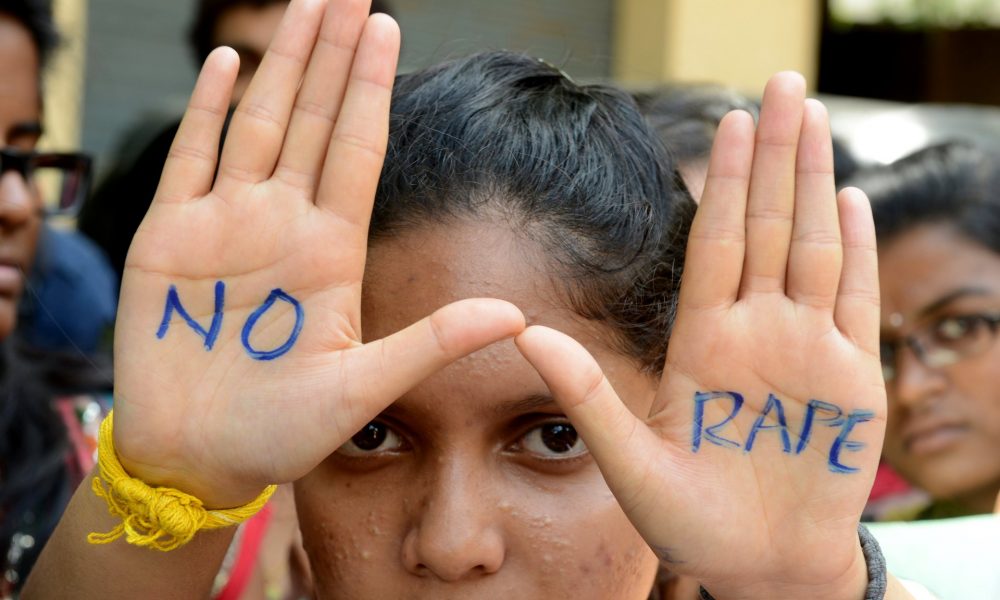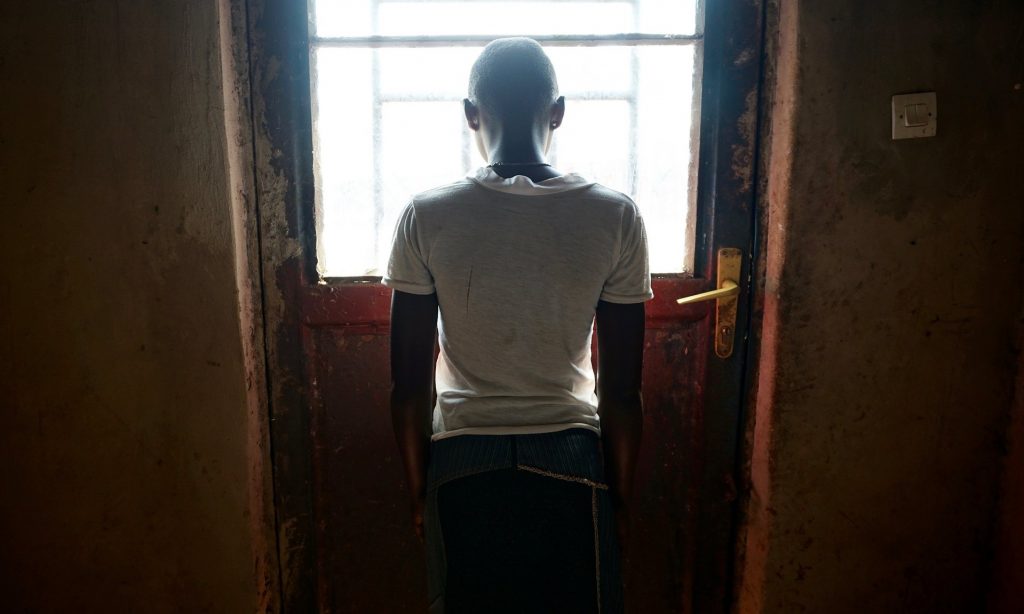Six years ago, Dee, we will call her, was brutally gang raped while on her way home from a party. She was intoxicated.
“I got pregnant and disgraced because of it and today the boy is six years old and I love him even though his father raped me,” she said, shyly looking away in embarrassment.

Dee was molested, stripped naked and sexually assaulted in the middle of the street for hours, according to police accounts and an officer who recalled the case. There is evidence that the attack was a very violent one which left her with permanent teeth marks between her thighs.
“I reported it to the Zone 7 police station in 2011 and because of so many irregularities – witnesses claiming I deserved it for being drunk, those that I accused being released because of lack of evidence – I had to leave the case, just like that,” she claimed.
Sitting next to her during this interview was an adorable boy who seemed so dependent on a mother who shows nothing but love and admiration for him. Though she does not know who his father is and she never had the opportunity to breastfeed him on doctor’s orders because of sexually transmitted diseases she had contracted, Dee holds no grudge in her heart for her child.
“It’s not his fault.”
Five years before Dee was assaulted, the Ministry of Foreign Affairs released, “An Act to Amend the New Penal Code Chapter 14 Sections 14.70 and 14.71 and to Provide for Gang Rape,” which was approved by the National Assembly in 2005. Had Dee been persistent and had kept up with the criminal charges and case of those responsible, this law would have kept her alleged abusers behind bars for good. The Act keeps in prison perpetrators who violate the rights of babies, teens and vulnerable women, men and boys.
Under the Rape Law of Liberia, perpetrators have no access to parole while serving their time in prison.
In 2013, a nine-year-old girl was sexually assaulted while easing herself in a wooded area behind her parent’s mud house. The perpetrator always bought cigarettes that her now deceased grandmother once sold. He knew his victim.
After coming back home walking and looking dizzy, her uncle inquired why she seemed so weak. Looking between the child’s legs, he noticed the child’s vagina was ‘inside out’
“Immediately we rushed her for a rape kit and arrested the guy after he tried to run away. We didn’t beat him though we wanted to, but we knew that justice would prevail and up until now, he is still in jail. But my niece has been damaged. She became seriously crippled and was sent into the sick bush. We have not seen her again because her father fell ill and he has not been able to give us any update on the little girl,” her uncle said in Caldwell community.
The perpetrator was found guilty and has already begun serving his sentence. He is pictured on a poster released by the Ministry of Gender. Though he claims his innocence, the evidence against him was authentic, in addition to witness accounts. Prior to his sentencing, he had spent more than two years without knowing his fate. The victim’s father fell ill and was unable to pursue his child’s case, which was later picked up by the Ministry of Gender and Social welfare. The case went to trial and the man was found guilty.
The child’s family commended the government for the strong Rape Law that allowed their case to be handled before the perpetrator had the chance through the law “to get away before he could be judged.”
Meanwhile, in the ‘history making’ of protecting the rights of girls by many human rights groups, advocates, activists and women who care, a recent amendment of the Rape Law on October 3, 2017 has left many women outraged, calling it a blow to their collective efforts.
Considering the fact that a new government is obvious after the November 7 runoff presidential election, women, policy and lawmakers are skeptical that all the laws put in place to protect women and girls will be reversed, and females in Liberia will be placed back into chains.
The Liberian Senate amended the amended version of the Rape Law, which was recently brought to the attention of the Senate by Sinoe County Senator J. Milton Teahjay.
According to a press release published on October 4, 2017, the Liberian Senate, consisting of all men, during its 60th day sitting of the 6th session, voted to amend the Rape Law. The Senate took the vote following a report from its statutory Committee on Judiciary recommending that rape should be a bailable offense as is provided for in the draft act submitted by Sen. Teahjay.
“The judiciary committee noted from the comparison of the original Rape Law and the proposed amendment that the punishment provided in the original Rape Law appears to be excessive and therefore unconstitutional,” it stated.
According to Article 21(d) (ii) of the 1986 Constitution of Liberia, excessive bail shall not be required, nor excessive fines imposed, nor excessive punishment inflicted.

Photograph: Noah Seelam/AFP/Getty Images
In the opinion of the judiciary committee, the punishment for rape as provided in the Rape Law is excessive and therefore unconstitutional.
“The committee also recommended that an accused person on bail for the commission of the crime of rape should report to the court which granted the bail on a monthly basis and that reporting should occur on the monthly anniversary of the grant of bail,” the release further stated.
In the meantime, one person who has spent the past fifteen years behind bars for the rape of a four-year old he said he did not rape but was forced into confessing that he had, is elated over the ruling.
He was also featured in the poster released by the Gender Ministry. He has continued to express through phone contacts with our reporter that he was intoxicated during the period when he was accused of violating the child, who is also his daughters’ cousin – both children were four years old at the time.
“I have done my time if I am guilty of this crime. I am innocent! Back when I was sentenced to life in prison for this crime, there was no real judiciary system in place. No rape kits. I wasn’t even put on trial the way people are today and I should have my chance to go to court again to prove my innocence and be united with my daughter who is eighteen now. I thank the government plenty for listening to our pleas here in the prison,” he added.
*Intentional penetration (however slight) of a penis into the vagina, anus, mouth, or any opening of another person, without that person’s consent; intentional penetration (however slight) of another body part (such as a finger) or an object (such as a gun, stick, candle, or bottle) into the vagina or anus of another person, without that person’s consent.
*Sexual intercourse (including any of the actions described above) between a person who is over 18 years of age and a person who is not yet 18 years of age, even if the younger person agreed to the act or was not forced into it.
Under the law, the following acts constitute gang rape:
*When a person agrees with one or more other people to engage in rape or to cause rape to occur.
*When a person purposely promotes or facilitates rape.
A person is said to have consented to the act
*If she agrees to it by choice, and has the freedom and capacity to make that choice.
A person is said not to have consented to the act if:
*Violence was used against her at the time of the act or immediately before it.
*The perpetrator caused her to fear that immediate violence would be used against her.
*The perpetrator made her fear that violence was being used against another person, or would be used against another person.
*The victim was detained at the time of the act.
*The victim was asleep or otherwise unconscious at the time of the act.
*Due to a physical disability, the victim was not able to communicate to the perpetrator whether she consented at the time of the act.
*The victim was administered or forced to take a substance that could have caused her to be stupefied or overpowered at the time of the act.
*The perpetrator intentionally induced the victim to consent to the act by impersonating someone else that the victim knows personally
In certain cases, rape is considered to be a felony:
*Of first degree, which can garner a maximum sentence of life imprisonment. These cases include those in which:
*The victim was less than 18 years old at the time of the offense.
*The offense involves gang rape.
*The rape results in permanent or serious bodily injury to the victim.
*The perpetrator threatened the victim with a firearm or other deadly weapon at the time of the rape or immediately before it.
In all other cases, rape is a second degree felony that carries 10 years maximum sentence and is non-bailable.

